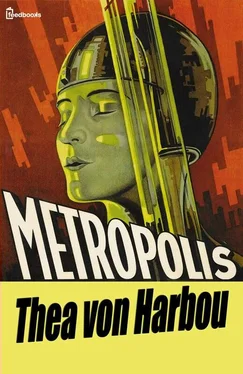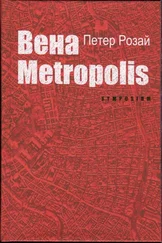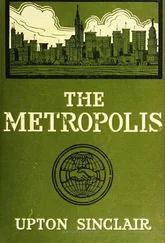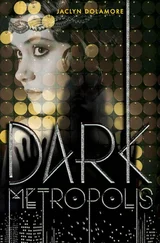A rocket shot up and wrote in the sky above Metropolis: Yoshiwara.
THERE WAS A HOUSE in the great Metropolis which was older than the town. Many said that it was older, even, than the cathedral, and, before the Archangel Michael raised his voice as advocate in the conflict for God, the house stood there in its evil gloom, defying the cathedral from out its dull eyes.
It had lived through the time of smoke and soot. Every year which passed over the city seemed to creep, when dying, into this house, so that, at last it was a cemetery — a coffin, filled with dead tens of years.
Set into the black wood of the door stood, copper-red, mysterious, the seal of Solomon, the pentagram.
It was said that a magician, who came from the East (and in the track of whom the plague wandered) had built the house in seven nights. But the masons and carpenters of the town did not know who had mortared the bricks, nor who had erected the roof. No foreman's speech and no ribboned nosegay had hallowed the Builder's Feast after the pious custom. The chronicles of the town held no record of when the magician died nor of how he died. One day it occurred to the citizens as odd that the red shoes of the magician had so long shunned the abominable plaster of the town. Entrance was forced into the house and not a living soul was found inside. But the rooms, which received, neither by day nor by night, a ray from the great lights of the sky, seemed to be waiting for their master, sunken in sleep. Parchments and folios lay about, open, under a covering of dust, like silver-grey velvet.
Set in all the doors stood, copper-red, mysterious, the seal of Solomon, the pentagram.
Then came a time which pulled down antiquities. Then the words were spoken: The house must die. But the house was stronger than the words, as it was stronger than the centuries. With suddenly falling stones it slew those who laid hands on its walls. It opened the floor under their feet, dragging them down into a shaft, of which no man had previously had any knowledge. It was as though the plague, which had formerly wandered in the wake of the red shoes of the magician, still crouched in the corners of the narrow house, springing out at men from behind, to seize them by the neck. They died, and no doctor knew the illness. The house resisted its destruction with so great a force that word of its malignity went out over the borders of the city, spreading far over the land, that, at last, there was no honest man to be found who would have ventured to make war against it. Yes, even the thieves and the rogues, who were promised remission of their sentence provided that they declared themselves ready to pull down the magician's house, preferred to go to the pillory, or even to the scaffold, rather than to enter within these spiteful walls, these latchless doors, which were sealed with Solomon's seal.
The little town around the cathedral became a large town and grew into Metropolis, and into the centre of the world.
One day there came to the town a man from far away, who saw the house and said: "I want to have that."
He was initiated into the story of the house. He did not smile. He stood by his resolution. He bought the house at a very low price, moved in at once and kept it unaltered.
This man was called Rotwang. Few knew him. Only Joh Fredersen knew him very well. It would have been easier for him to have decided to fight out the quarrel about the cathedral with the sect of Gothics than the quarrel with Rotwang about the magician's house.
There were in Metropolis, in this city of reasoned, methodical hurry, very many who would rather have gone far out of their way than have passed by Rotwang's house. It hardly reached knee-high to the house-giants which stood near it. It stood at an angle to the street. To the cleanly town, which knew neither smoke nor soot, it was a blot and an annoyance. But it remained. When Rotwang left the house and crossed the street, which occurred but seldom, there were many who covertly looked at his feet, to see if, perhaps, he walked in red shoes.
Before the door of this house, on which the seal of Solomon glowed, stood Joh Fredersen.
He had sent the car away and had knocked.
He waited, then knocked again.
A voice asked, as if the house were speaking in its sleep:
"Who is there?"
"Joh Fredersen," said the man.
The door opened.
He entered. The door closed. He stood in darkness. But Joh Fredersen knew the house well. He walked straight on, and as he walked, the shimmering tracks of two stepping feet glistened before him, along the passage, and the edge of the stair began to glow. Like a dog showing the track, the glow ran on before him, up the steps, to die out behind him.
He reached the top of the stairs and looked about him. He knew that many doors opened out here. But on the one opposite him the copper seal glowed like a distorted eye, which looked at him.
He stepped up to it. The door opened before him.
Many doors as Rotwang's house possessed, this was the only one which opened itself to Joh Fredersen, although, and even, perhaps, because, the owner of this house knew full well that it always meant no mean effort for Joh Fredersen to cross this threshold.
He drew in the air of the room, lingeringly, but deeply, as though seeking in it the trace of another breath…
His nonchalant hand threw his hat on a chair. Slowly, in sudden and mournful weariness, he let his eyes wander through the room.
It was almost empty. A large, time-blackened chair, such as are to be found in old churches, stood before drawn curtains. These curtains covered a recess the width of the wall.
Joh Fredersen remained standing by the door for a long time, without moving. He had closed his eyes. With incomparable impotence he breathed in the odour of hyacinths, which teemed to fill the motionless air of this room.
Without opening his eyes, swaying a little, but aim-sure, he walked up to the heavy, black curtains and drew them apart.
Then he opened his eyes and stood quite still…
On a pedestal, the breadth of the wall, rested the head of a woman in stone…
It was not the work of an artist, it was the work of a man, who, in agonies for which the human tongue lacks words, had wrestled with the white stone throughout immeasurable days and nights until at last it seemed to realise and form the woman's head by itself. It was as if no tool had been at work here — no, it was as if a man, lying before this stone, had called on the name of the woman, unceasingly, with-all the strength, with all the longing, with all the despair, of his brain, blood and heart, until the shapeless stone took pity on him letting itself turn into the image of the woman, who had meant to two men all heaven and all hell.
Joh Fredersen's eyes sank to the words which were hewn into the pedestal, roughly, as though chiselled with curses.
HEL
Born
To be my happiness, a blessing to all men.
Lost to Joh Fredersen
Dying in giving life to his son, Freder
Yes, she died then. But Joh Fredersen knew only too well that she did not die from giving birth to her child. She died then because she had done what she had to do. She really died on the day upon which she went from Rotwang to Joh Fredersen, wondering that her feet left no bloody traces behind on the way. She had died because she was unable to withstand the great love of Joh Fredersen and because she had been forced by him to tear asunder the life of another.
Never was the expression of deliverance at last more strong upon a human face than upon Hel's face when she knew that she would die.
But in the same hour the mightiest man in Metropolis had lain on the floor, screaming like a wild beast, the bones of which are being broken in its living body.
Читать дальше












